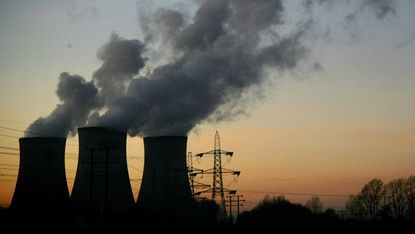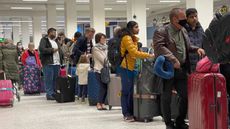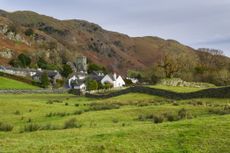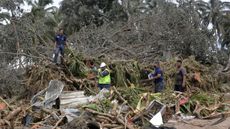Blackout fears as UK power capacity falls
National Grid to raise prospect of blackouts as spare capacity in the UK electricity system slumps to seven-year low

The risk of power blackouts this winter has increased significantly since last year, the National Grid is expected to announce today.
Spare capacity, the difference between the demand for energy and the supply, is believed to be at a seven-year low.
It fell from 15 per cent three years ago to five per cent last year and is expected to be lower again this year.
Subscribe to The Week
Escape your echo chamber. Get the facts behind the news, plus analysis from multiple perspectives.

Sign up for The Week's Free Newsletters
From our morning news briefing to a weekly Good News Newsletter, get the best of The Week delivered directly to your inbox.
From our morning news briefing to a weekly Good News Newsletter, get the best of The Week delivered directly to your inbox.
A series of fires have curtailed supply, including one at Didcot B power station last week, and earlier this month EDF announced that two nuclear power stations, Heysham 1 and Hartlepool, would produce as little as 75 per cent of their normal output for up to two years.
"The plants were shut down in August after cracks were found in a key structural component at Heysham," says The Times. "EDF plans to return the plants to service over the next two months but at a lower temperature, and therefore lower output, to reduce the risk of more cracks developing."
On top of that, EU rules have required older polluting plants to be closed and uneconomic gas plants have been shut down, says BBC correspondent Esyllt Carr.
The National Grid, which operates the national power network, is due to publish its winter outlook later today and is expected to announce the measures it is taking to keep the lights switched on.
It will pay some power plants to remain on standby and other firms to switch off their electricity during peak demand in winter, which is on weekdays between 4pm and 8pm.
"Critics will seize on the decline in spare capacity as evidence that Britain's energy market is failing," says Carr. "Not least, as those margins are expected to become even tighter next year."
Energy regulator Ofgem has warned that spare capacity could slump as low as two per cent in 2015. The government has announced plans to buy in vast amounts of back-up power, but this will not kick in for another few years.
Create an account with the same email registered to your subscription to unlock access.
Sign up for Today's Best Articles in your inbox
A free daily email with the biggest news stories of the day – and the best features from TheWeek.com
-
 'Make legal immigration a more plausible option'
'Make legal immigration a more plausible option'Instant Opinion Opinion, comment and editorials of the day
By Harold Maass, The Week US Published
-
 LA-to-Las Vegas high-speed rail line breaks ground
LA-to-Las Vegas high-speed rail line breaks groundSpeed Read The railway will be ready as soon as 2028
By Peter Weber, The Week US Published
-
 Israel's military intelligence chief resigns
Israel's military intelligence chief resignsSpeed Read Maj. Gen. Aharon Haliva is the first leader to quit for failing to prevent the Hamas attack in October
By Justin Klawans, The Week US Published
-
 Home Office worker accused of spiking mistress’s drink with abortion drug
Home Office worker accused of spiking mistress’s drink with abortion drugSpeed Read Darren Burke had failed to convince his girlfriend to terminate pregnancy
By The Week Staff Published
-
 In hock to Moscow: exploring Germany’s woeful energy policy
In hock to Moscow: exploring Germany’s woeful energy policySpeed Read Don’t expect Berlin to wean itself off Russian gas any time soon
By The Week Staff Published
-
 Were Covid restrictions dropped too soon?
Were Covid restrictions dropped too soon?Speed Read ‘Living with Covid’ is already proving problematic – just look at the travel chaos this week
By The Week Staff Last updated
-
 Inclusive Britain: a new strategy for tackling racism in the UK
Inclusive Britain: a new strategy for tackling racism in the UKSpeed Read Government has revealed action plan setting out 74 steps that ministers will take
By The Week Staff Published
-
 Sandy Hook families vs. Remington: a small victory over the gunmakers
Sandy Hook families vs. Remington: a small victory over the gunmakersSpeed Read Last week the families settled a lawsuit for $73m against the manufacturer
By The Week Staff Published
-
 Farmers vs. walkers: the battle over ‘Britain’s green and pleasant land’
Farmers vs. walkers: the battle over ‘Britain’s green and pleasant land’Speed Read Updated Countryside Code tells farmers: ‘be nice, say hello, share the space’
By The Week Staff Published
-
 Motherhood: why are we putting it off?
Motherhood: why are we putting it off?Speed Read Stats show around 50% of women in England and Wales now don’t have children by 30
By The Week Staff Published
-
 Tonga’s tsunami: the aid effort turns political
Tonga’s tsunami: the aid effort turns politicalSpeed Read Efforts to help Tonga’s 105,000 residents have been beset by problems
By The Week Staff Published